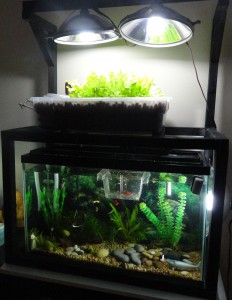Build an Aquaponics Farm with your Fish Tank!
4 min read
Greenmoxie™ –
Do you like fresh, organic, free veggies? Do you not like going to the store to buy Mexican lettuce that’s spent days in the back of a truck? Do you also like to look at pretty fishies?
Let us offer you the perfect solution: Aquaponics!
“Aquaponics is the cultivation of fish and plants together in a re-circulating, closed loop ecosystem. Aquaponics is a hydroponic growing method that requires no soil. The plant roots are bathed in nutrient rich, highly oxygenated water that sees growth rates far above soil-grown plants. The “aqua” in aqauponics refers to the fish side of the equation. Natural bacterial cycles are utilized to convert fish waste to plant nutrients. Plants in turn, clean and filter the water that returns to the fish environment.”
What this means is that you can use a fish tank to fuel a veggie garden – right in your own home – no pesticides, no soil, and a constant supply of healthy greens!
So let’s get started with what you need to get started:
The first thing you should do is get a fish tank. Get it up and running and get some little fishies in there (whatever kind you like – as long as they poop) and get everything stabilized and functioning – it will take a little while to get the water just right so your fish don’t keep dying off.
The next thing you’ll need to do is to make a frame to hold the grow bed above the tank – it doesn’t need to be above the tank – but it will save some space – so for the purposes of this tutorial – put it above the tank. The frame will need to be sturdy enough to hold whatever container you use for a grow bed, full of water.
Next, build yourself a bell siphon. This bell siphon will allow your grow bed to automatically drain once the level of water has reached the desired height. Check out this awesome how-to from a favorite poster of mine on how to build your very bell siphon
Drill a hole in the bottom of your selected grow bed container and mount the siphon into your container using some rubber washers, silicone sealant or whatever else you need to keep it water tight (we just used a plastic storage bin that was more or less the same dimensions as the tank). Connect some piping to the outlet of the bell siphon to allow the drained water to feed back into the fish tank (another good reason to locate the grow bed above the fish tank).
Get yourself a submersible water pump. This is what the likes of ebay were created for. You don’t need anything crazy powerful – the one I got pumps 200 litres/hour, cost me about $7 and in on the high side of over-kill. Mount the pump in the bottom of the fish tank with a length of appropriate sized tubing connecting the outlet of the pump with an inlet into the grow bed.
Get some lights and mount them above the grow bed. I used standard compact fluorescents with some fun parabolic mirrored fixtures I found at a random store – but a linear (straight) fluorescent fixture would work fine. Get bulbs that output 5000 Kelvin colour temperature – otherwise known as ‘daylight’ spectrum. Depending on what you plan on growing – these lights should be fine – for smallish stuff like lettuce etc.
Get some growing media. I went to a hydroponics store and got myself a bag of clay pellets – theoretically other substances would work (coarse gravel, rocks, etc) but I wanted to do it properly. Wash the pellets when you get them home to avoid filling your tank with clay dust, fill your grow bed with them, then run the pump to fill the grow bed with fish tank water – BAM. You’re practically done!
If you wanna be fancy and free up a bunch of your time, integrate some lighting timers like I did to control the pump, lights and heater (depending on the type of fish you selected) so that the whole business will function all on its own. Automatic fish feeders take that one step further even.
Run the pump once to wet the growing media, sprinkle some of your favorite vegetable seeds over them while wet so they stick, and sit back and wait to reap the rewards!
It’s not rocket surgery, and we’re no surgeons – so play around with the variables and report back with successes and failures!
(c) Greenmoxie™ – Read entire story here.








